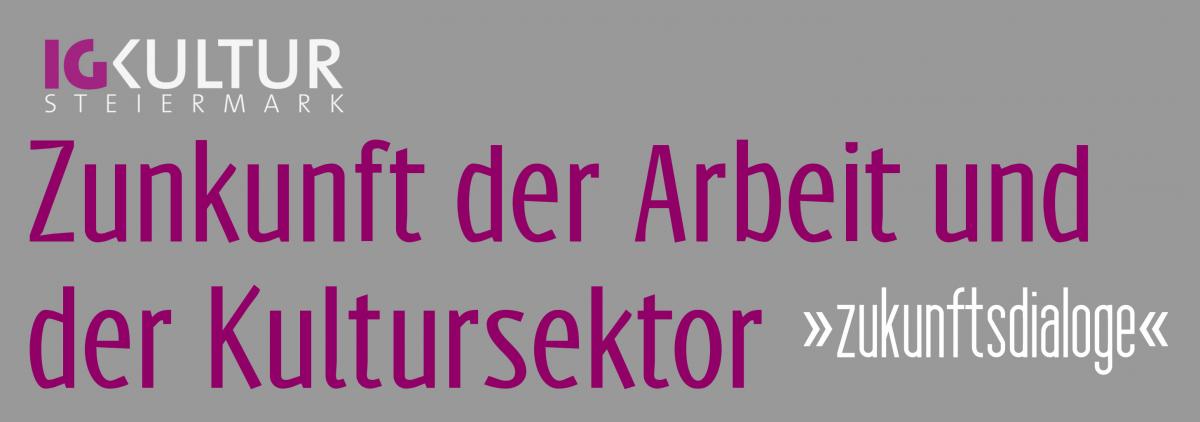zukunftsdialoge#3 Zukunft der Arbeit und der Kultursektor


Vortrag “Wie verändert die Digitalisierung die Arbeitswelt und bietet dies neue Chancen für den Kultursektor?” von Mag.Hans Holzinger
Donnerstag, 28. Juni 2018
Beginn: 16 bis ca. 19 Uhr Ort: Spektral ( Lendkai 45, 8020 Graz )
***************
Internationale Studien prognostizieren einen dramatischen Rückgang der Arbeitsplätze durch die neuen Technologien der Robotik sowie der künstlichen Intelligenz. Nicht nur einfache manuelle Tätigkeiten, sondern auch komplexe Arbeitsabläufe sollen durch lernende Maschinen koordiniert und ausgeführt werden. Gesprochen wird von High-Tech-Landwirtschaft, menschenleeren Fabriken sowie digitalen Dienstleistungsangeboten. Was ist dran an diesen Prognosen? Und wenn sie stimmen, welche neuen Antworten sind für die Arbeitswelt zu finden? Werden mehr Menschen zukünftig in Face-to-Face-Berufen im Kultur-, Bildungs- und Care-Bereich arbeiten? Sollen wir mit der digitalen Dividende neue Arbeitszeitmodelle und kürzere Arbeitszeiten finanzieren? Und welche Chancen bietet dies für den Kultursektor?
Mag. Hans Holzinger ist wissenschaftlicher Mitarbeiter und pädagogischer Leiter der Robert-Jungk-Bibliothek für Zukunftsfragen in Salzburg. Als Mitherausgeber der Zeitschrift PRO ZUKUNFT sowie in Studien und Büchern setzt er sich mit Themen wie die Zukunft der Arbeit und sozialen Sicherung bzw. Neuen Wohlstandsmodellen auseinander. Zuletzt erschienen sind „Von nichts zu viel – für alle genug“ (2016) und „Wie wirtschaften. Ein kritisches Glossar“ (2018).
***************
Offener Lesekreis
moderiert von Mag. Lidija Krienzer-Radojevic, IG Kultur Steiermark
Freitag, 8. Juni 2018
Beginn: 16 bis ca. 18 Uhr
Ort: KiG!, Volkshaus (Lagergasse 98a, 8020 Graz)
Zur Vorbereitung auf den Vortrag laden wir zu einem offenen Lesekreis ein. Dieser Termin bietet die Möglichkeit das Thema vertiefend zu betrachten, ist jedoch nicht notwendig um den Vortrag folgen zu können. Gemeinsam wird zwei Texte aus den Buch Art Workers – Material Conditions and Labour Struggles in Contemporary Art Practice diskutiert:
Erik Krikortz: Paying Artist: The Unfulfilled Promises of the MU Agreement
Corina Apostol: Art Workers Between Precarity and Resistence: A Genealogy
***************
The book Art Workers is the outcome of a networking process initiated by a group of art workers from Helsinki, Stockholm and Tallinn in 2012. The network was born out of the need to establish a political and intellectual framework for supporting and sustaining local initiatives which are advocating for change in the precarious work realities that dominate the visual art sector. The idea to form an exchange platform for sharing useful knowledges, practices and resistive strategies grew out of two self-organised initiatives in particular – the Reko collective in Stockholm and the art workers’ movement in Tallinn.
Erik Krikortz discusses the effects of the notorious MU Agreement in Sweden. In the Nordic and Baltic region the Agreement is often celebrated as a progressive ideal that deserves to be strived for. Indeed, in many ways, the MU Agreement represents an exemplary model for regulating work relations between artists and art institutions – not only because it establishes parameters according to which artistic labour should be remunerated, but perhaps even more importantly, because it sets a paradigm in which the abolishment of unpaid labour within exhibition practice is linked to a political decision rather than delegated into the realm of informal agreements among collegial peers in the art field. However, as much as the MU Agreement serves as an exemplary case of “ best practice ” – to use the managerial vocabulary that is favoured by cultural policy makers – a prototype legislation that has stimulated fruitful discussions about the remuneration of artistic labour widely beyond the national borders of Sweden, its actual effects are far from being supreme. As Erik Krikortz demonstrates in his contribution, the limited ramifications of the MU Agreement are not only a result of its narrow scope which applies to a handful of state-run institutions, but also the lacking control
mechanisms that would monitor and, if needed, sanction art institutions that do not comply to the standards established in the agreement. In fact, during the first years after the introduction of the MU Agreement, it was the artists’ initiative Reko that observed and evaluated its effects. Writing from the perspective of this independent “ public watchdog, ” Erik Krikortz revisits the MU Agreement from a critical perspective, reflecting on the developments that have followed its introduction during the last six years.
The precarious work reality in the art field will not change unless art workers organise and struggle against it. Corresponding with that battle call, in recent years, there has been a wave of art workers’ collectives emerging in various localities of the international art world. This wave of mobilisation has brought along an intensified interest for the historical legacy of labour organising within the art field. A great deal of such research has been collected and published in the ArtLeaks Gazette. Corina L. Apostol, co-founder of the ArtLeaks platform, summarises this research in her contribution which sketches a genealogy from Paris Commune to contemporary activist groups.Reflecting on historical moments when art practitioners have sought affinities and alliances with workers’ movements and revolutionary struggles, she builds a ground for a comparative study that articulates both continuity and change.
——————————
eine Veranstaltung der IG Kultur Steiermark ›› https://www.igkultur.at/artikel/zukunftsdialoge3-zukunft-der-arbeit-und-der-kultursektor?bundesland=steiermark

Leave a Reply